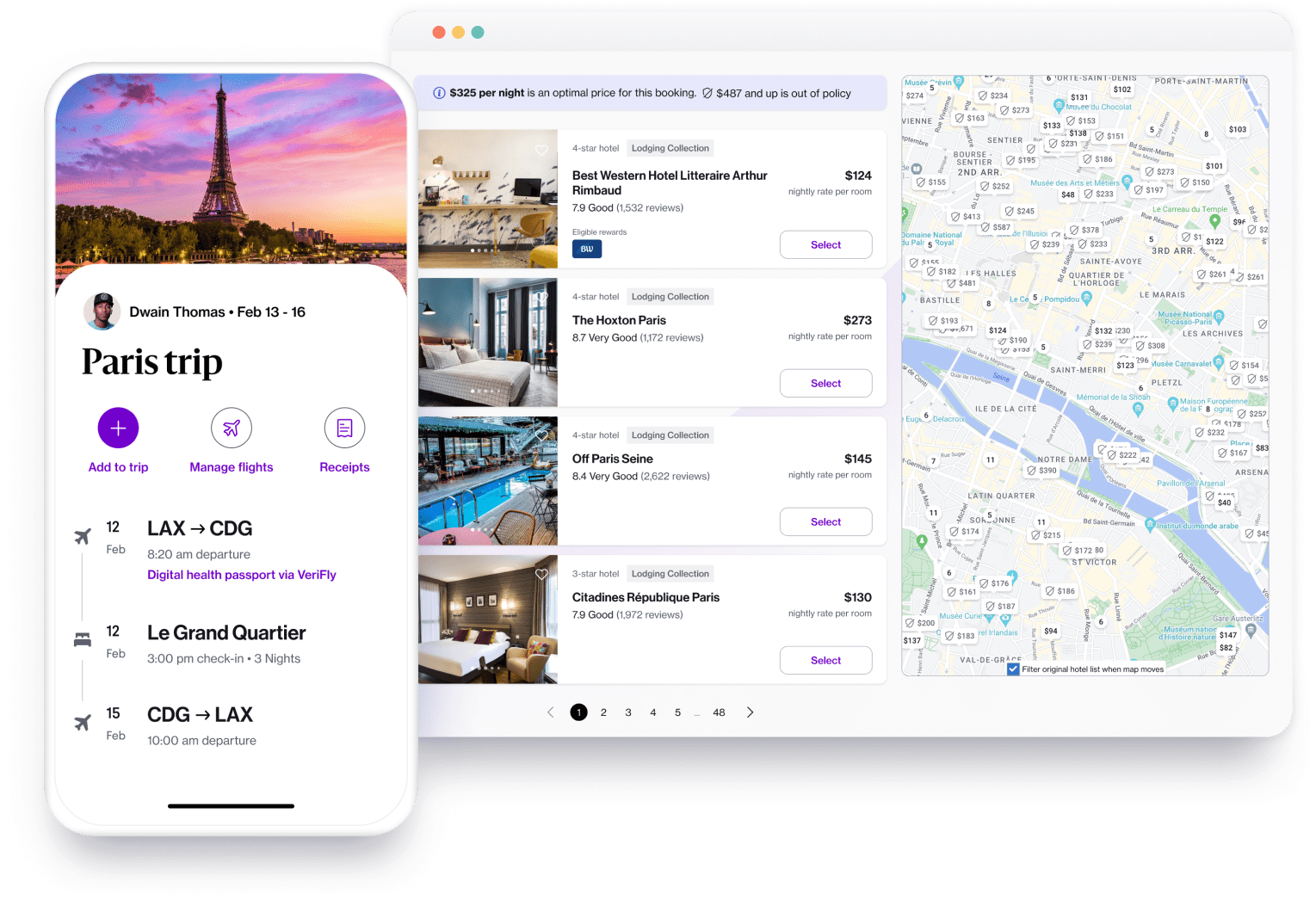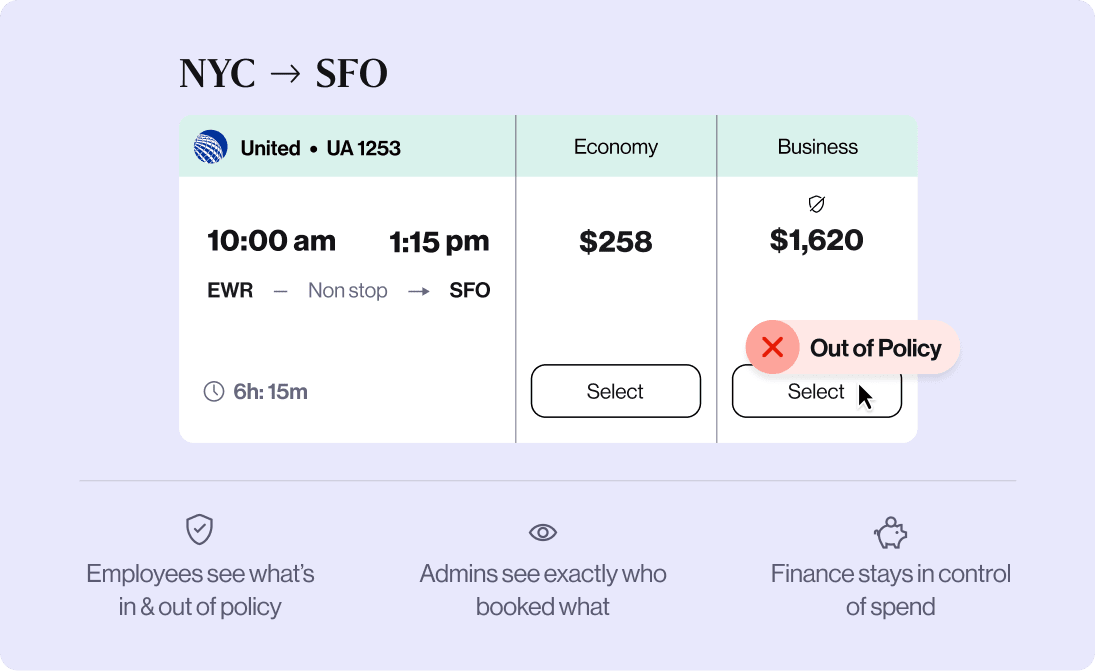Why Do Corporate Travel Pros Use Self-Booking Tools

Outdated corporate travel management processes are quickly becoming a thing of the past, replaced by modern solutions that give both employees and managers greater flexibility and control. Leading this transformation is the self-booking tool for corporate travel.
In this guide, we’ll break down what self-booking systems are, why they’re gaining traction, and how your business can benefit from adopting one.
What Is a Corporate Self-Booking Tool?
A corporate self-booking tool is a digital platform where travelers can book and manage their work-related travel on their own, without needing to go through a travel manager. These systems support independent booking, reduce the need for constant oversight, and help improve compliance with company policies.

Above: A traveler's view of a trip itinerary and hotel search within the Navan platform.
Why Self-Booking Tools Are Gaining Ground in Corporate Travel
As companies rethink how they manage business travel, self-booking tools for corporate travel are quickly becoming the standard, with 78% of American business travelers stating they prefer self-service booking technology (GBTA). Legacy systems and manual approval workflows no longer meet the needs of fast-moving teams. In their place, businesses are turning to platforms that let employees handle bookings directly, while still maintaining visibility and control.
By adopting self-service business travel tools, companies are positioning themselves to move faster, stay compliant, and offer a smoother travel experience. All without relying on outdated, manual systems.
Case Study: How Paysafe Transformed Business Travel With Navan
Before adopting Navan’s travel solution, Paysafe used an outdated system for business travel management. Within just seven months, more than 95% of employees adopted the new platform. Furthermore, Navan’s solution saved the company’s travel managers 30 hours of work per week, allowing them to focus on more pressing tasks.
Advantages of Self-Booking Tools for Corporate Travelers
Modern self-service business travel systems provide practical advantages for multiple teams across the organization.
For business travelers:
- Faster bookings: Travelers can book flights, hotels, and transport in minutes.
- Greater flexibility: Employees can book on the go or make changes as plans shift.
- Clear policy guidance: The system shows only policy-compliant options or flags anything that’s outside company rules.
For finance and operations:
- Cost control: Corporate self-booking tools provide access to negotiated rates and preferred vendors.
- Real-time data: Get instant visibility into spend by employee, team, or department.
- Policy enforcement: Provides consistent travel policy application across the business without manual oversight.

Above: An example of policy enforcement on the Navan platform.
What to Look for in a Self-Booking Tool
Self-booking tool capabilities can vary from one platform to another. When comparing self-booking tools, look for features that strike the right balance between control and flexibility.
Here’s what to prioritize:
- User-friendly interface and mobile support
- Comprehensive inventory (air, hotel, rail, car)
- Customizable policies and approval flows
- Automated receipts and expense sync
- 24/7 support
Pro-tip: Leverage AI for Smarter, Smoother Support
A travel platform with AI-driven support tools can elevate your travel program even further. AI-powered chatbots deliver instant, round-the-clock assistance for common travel hiccups like rebooking flights. For complex issues, live agents are just a call away.

Above: Navan’s AI-powered virtual assistant, providing real-time travel support.
Self-Booking vs. Agent Assistance: Which Should You Use?
Choosing between a travel management company’s self-booking tool and an agent's assistance doesn’t have to be all or nothing. By integrating both, companies can encourage travelers to handle simple bookings independently while knowing that support is always available when needed.
Self-Booking for Simple Trips
Self-booking tools are an excellent choice for straightforward itineraries that don’t involve connecting flights or unusual requirements. These platforms save time and help enforce compliance with corporate travel policies, all while offering travelers the convenience of choice.
Corporate Travel Agents for Complex Journeys
When the travel plan involves uncommon routes, connecting flights, or large group bookings, an agent’s experience is invaluable. Agents can navigate unique requirements, adjust to last-minute changes, and often access various resources and solutions.
Empowering Travelers with Self-Booking Tools
Self-booking tools are shaping the future of business travel by giving employees the freedom to manage their trips with ease, while keeping travel aligned with company goals. This balance of flexibility and control helps businesses move faster, stay compliant, and create better experiences for everyone on the road.
Looking to modernize your corporate travel program?
This content is for informational purposes only. It doesn't necessarily reflect the views of Navan and should not be construed as legal, tax, benefits, financial, accounting, or other advice. If you need specific advice for your business, please consult with an expert, as rules and regulations change regularly.
More content you might like
Take Travel and Expense Further with Navan
Move faster, stay compliant, and save smarter.